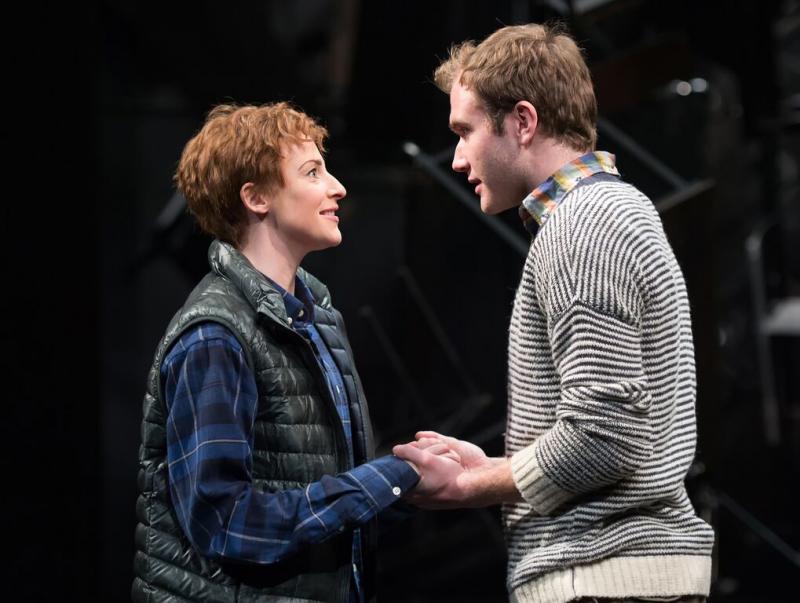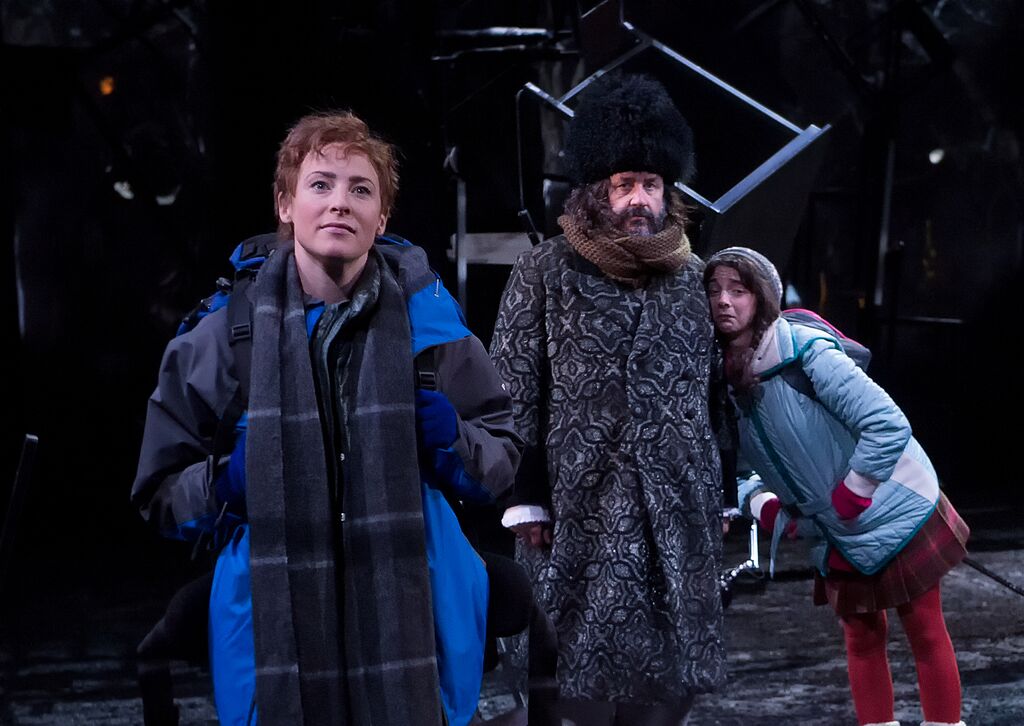As You Like It, National Theatre | reviews, news & interviews
As You Like It, National Theatre
As You Like It, National Theatre
A magical Forest of Arden indeed, though not without its thorns

Rosalind’s “working-day world” takes an unexpectedly literal turn in Polly Findlay’s sparky new As You Like It for the National Theatre. An opening sequence, set in a windowless trading-floor, opens out in one of the year’s most bewitching set transformations into a brown and scrubby Forest of Arden, whose flowers bloom all the brighter for their delayed appearance.
Findlay’s thoughtful production refuses to take Shakespeare’s magical forest at face value. Like the woods of A Midsummer Night’s Dream, this space-beyond-authority is capable of darkness as well as joy, and redemption must be earned. The desks and chairs that make up the office of the opening may have become trees, but their metamorphosis is fragile – one of perception rather than substance.
Things start badly. A strip-lit office plays out all the aggressive clichés of urban office-life – workers eat, labour, rest at the signal of bells, like human automatons, and the only greenery comes from the stunted bonsai trees that sit sadly on each desk. It’s unclear where Rosalie Craig’s Rosalind or Patsy Ferran’s Celia fit in, walking around in pyjamas at one point, nor why the wrestling match (surely the least exciting sequence of the play) needs to be quite so extended in its eager take on the stagy posturing of Mexican wrestling.
 Once the Duchy is dispatched, however, Findlay’s production undergoes its own sea-change, becoming something altogether more sensitive. No broad yokels here (though an inspired flock of sheep pick up the comic slack), just a collection of good-natured folk who are down on their luck, stage-managed by Corin (Alan Williams) who wields his shepherd’s crook like Prospero’s staff, quietly directing the action from the wings. Ken Nwosu’s Silvius is sweetly insistent rather than outright stupid, tussling with Gemma Lawrence’s understated Phebe. Even Audrey (played with gentle Irish burr by Siobhan McSweeney) is no caricature.
Once the Duchy is dispatched, however, Findlay’s production undergoes its own sea-change, becoming something altogether more sensitive. No broad yokels here (though an inspired flock of sheep pick up the comic slack), just a collection of good-natured folk who are down on their luck, stage-managed by Corin (Alan Williams) who wields his shepherd’s crook like Prospero’s staff, quietly directing the action from the wings. Ken Nwosu’s Silvius is sweetly insistent rather than outright stupid, tussling with Gemma Lawrence’s understated Phebe. Even Audrey (played with gentle Irish burr by Siobhan McSweeney) is no caricature.
These characters provide the promising backdrop to the production’s real draw – a central trio who feed off each other’s energy and scramble to grab the most delight from Shakespeare’s most whimsical love-story. Rosalie Craig’s luminous Rosalind – the NT’s first since 1979 – is all poised grace and direct gaze: who wouldn’t fall for her (in either of her incarnations)? Joe Bannister’s Orlando doesn’t stand a chance. This hapless charmer might have a little too much of Clapham-via-Cambridge about him, but is amiable and endlessly watchable, generating real warmth with Craig. It’s the partnership of Craig and Ferran’s goofy, gloriously deadpan Celia (pictured above with Craig and Mark Benton's Touchstone), however, that almost steals the evening.
 The wonderful Paul Chahidi (pictured left) makes much of Jacques, under- rather than overworking his posturing, and undermining expectation with his sincerity. Benton’s Touchstone, by contrast, remains stubbornly unfunny, and John Ramm’s exiled Duke gets lost in all the goings-on.
The wonderful Paul Chahidi (pictured left) makes much of Jacques, under- rather than overworking his posturing, and undermining expectation with his sincerity. Benton’s Touchstone, by contrast, remains stubbornly unfunny, and John Ramm’s exiled Duke gets lost in all the goings-on.
Lizzie Clachan’s set is the inspired scaffolding from which all of Findlay’s subsequent ideas hang so neatly, aided by Jon Clark’s delicate lighting. Hidden away in her dangling “trees” are company members who provide a living foley accompaniment to the action, whether rustling leaves, drizzling rain or beating bird-wings. It’s all rather Complicite-lite, but none the worse for it. The sound-effects play off Orlando Gough’s score, which treads lightly between pastiche and innovation. On its own it’s a beautiful thing, but appended to this particular production it lacks the uncomplicated rhythmic drive, the unmediated joy to provide a really satisfying final jig, and tends to halt the action rather than aid it along.
There’s good and bad here, but the overall effect is one of delight. You surrender willingly to the metamorphosis of a forest all the more magical for its sober realities, wooed with just enough wit and whimsy.
- As You Like It is at the National Theate until 5 March 2016
rating
Explore topics
Share this article
Add comment
The future of Arts Journalism
You can stop theartsdesk.com closing!
We urgently need financing to survive. Our fundraising drive has thus far raised £49,000 but we need to reach £100,000 or we will be forced to close. Please contribute here: https://gofund.me/c3f6033d
And if you can forward this information to anyone who might assist, we’d be grateful.

Subscribe to theartsdesk.com
Thank you for continuing to read our work on theartsdesk.com. For unlimited access to every article in its entirety, including our archive of more than 15,000 pieces, we're asking for £5 per month or £40 per year. We feel it's a very good deal, and hope you do too.
To take a subscription now simply click here.
And if you're looking for that extra gift for a friend or family member, why not treat them to a theartsdesk.com gift subscription?
more Theatre
 Hamlet, National Theatre review - turning tragedy to comedy is no joke
Hiran Abeyeskera’s childlike prince falls flat in a mixed production
Hamlet, National Theatre review - turning tragedy to comedy is no joke
Hiran Abeyeskera’s childlike prince falls flat in a mixed production
 Rohtko, Barbican review - postmodern meditation on fake and authentic art is less than the sum of its parts
Łukasz Twarkowski's production dazzles without illuminating
Rohtko, Barbican review - postmodern meditation on fake and authentic art is less than the sum of its parts
Łukasz Twarkowski's production dazzles without illuminating
 Lee, Park Theatre review - Lee Krasner looks back on her life as an artist
Informative and interesting, the play's format limits its potential
Lee, Park Theatre review - Lee Krasner looks back on her life as an artist
Informative and interesting, the play's format limits its potential
 Measure for Measure, RSC, Stratford review - 'problem play' has no problem with relevance
Shakespeare, in this adaptation, is at his most perceptive
Measure for Measure, RSC, Stratford review - 'problem play' has no problem with relevance
Shakespeare, in this adaptation, is at his most perceptive
 The Importance of Being Earnest, Noël Coward Theatre review - dazzling and delightful queer fest
West End transfer of National Theatre hit stars Stephen Fry and Olly Alexander
The Importance of Being Earnest, Noël Coward Theatre review - dazzling and delightful queer fest
West End transfer of National Theatre hit stars Stephen Fry and Olly Alexander
 Get Down Tonight, Charing Cross Theatre review - glitz and hits from the 70s
If you love the songs of KC and the Sunshine Band, Please Do Go!
Get Down Tonight, Charing Cross Theatre review - glitz and hits from the 70s
If you love the songs of KC and the Sunshine Band, Please Do Go!
 Punch, Apollo Theatre review - powerful play about the strength of redemption
James Graham's play transfixes the audience at every stage
Punch, Apollo Theatre review - powerful play about the strength of redemption
James Graham's play transfixes the audience at every stage
 The Billionaire Inside Your Head, Hampstead Theatre review - a map of a man with OCD
Will Lord's promising debut burdens a fine cast with too much dialogue
The Billionaire Inside Your Head, Hampstead Theatre review - a map of a man with OCD
Will Lord's promising debut burdens a fine cast with too much dialogue
 50 First Dates: The Musical, The Other Palace review - romcom turned musical
Date movie about repeating dates inspires date musical
50 First Dates: The Musical, The Other Palace review - romcom turned musical
Date movie about repeating dates inspires date musical
 Bacchae, National Theatre review - cheeky, uneven version of Euripides' tragedy
Indhu Rubasingham's tenure gets off to a bold, comic start
Bacchae, National Theatre review - cheeky, uneven version of Euripides' tragedy
Indhu Rubasingham's tenure gets off to a bold, comic start

Comments
no wonder Jaques is depressed